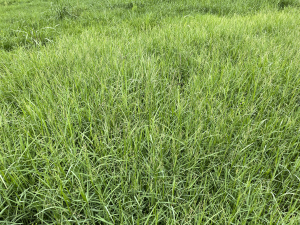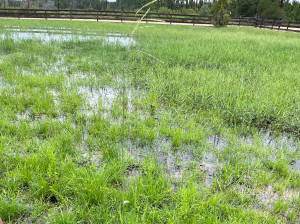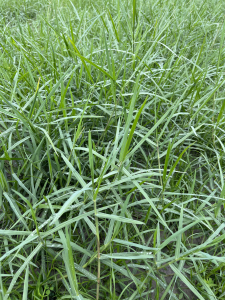
Horse owners have the utmost concern for their animals, and one of their top concerns is toxic plants. Florida’s tropical climate supports a variety of non-native, often tropical species that can cause toxicity issues for livestock. Producers are constantly on the lookout for new plants popping up in the pasture that could pose a risk, as you should. However, we tend to not suspect grasses as being harmful even though they, too, can pose toxicity risks.
A new toxicity discovery (via Google)
While visiting a Clay County producer this summer, I identified a thick Torpedograss patch spreading throughout a low wet pasture. Our primary concern was controlling the Torpedograss to allow the planted Bahiagrass to establish. The horses on the property did not have access to the newly planted paddock yet. Torpedograss control is a challenge already; the grass is aggressive and can grow from small fragments of rhizomes. The only effective chemical control options are non-selective herbicides that would surely injure newly sprouted Bahiagrass.

While researching and developing a management plan for the pasture, I decided to double check Torpedograss toxicity. My background in cattle can sometimes fool me when it comes to toxicity to horses. (There are quite a few plants that are not toxic to cattle at all but could seriously harm your horse!) A simple online search gave me a shock. I found a variety of claims spanning from not toxic to horses to causing a quick death. I called the producer and had them hold off on putting the horses out.
All the toxicity claims came from farming blogs and websites, and the sources behind the information were hard to identify. Still, a phrase like, “[Horses] who eat this grass often develop severe anemia and die,” is sure to raise horse owners’ concerns (Plants Toxic to Horses, SpeedHorse Magazine). I couldn’t single out any research-based information coming from a university or any other reputable source with any substantial information on Torpedograss toxicity in horses. (Research tip: add “extension” to your search and look for information from universities to find research-based answers.) I reached out to equine specialists at UF to point me in the right direction.
What’s the truth?
 Torpedograss (Panicum repens) is in the same genus as Fall Panicum (Panicum dichotomiflorum) a known poisonous plant in the horse community. Fall Panicum may contain Steroidal saponins that could lead to liver disease in horses within two weeks of consumption. However, the amount of biomass needed to be consumed and the actual trigger for toxicity is not well understood or researched (Fall Panicum Toxicity in Horses, Virginia Cooperative Extension). Another study looked at another species of the shared genus, Panicum maximum of the Amazon region. This limited study found that under certain conditions, Panicum maximum could cause intestinal fermentation followed by bloat in horses, however none of the conditions of this study proved to be fatal (Bloat and colic in horses experimentally induced by the ingestion of Panicum maximum, Cerqueira, et al.)
Torpedograss (Panicum repens) is in the same genus as Fall Panicum (Panicum dichotomiflorum) a known poisonous plant in the horse community. Fall Panicum may contain Steroidal saponins that could lead to liver disease in horses within two weeks of consumption. However, the amount of biomass needed to be consumed and the actual trigger for toxicity is not well understood or researched (Fall Panicum Toxicity in Horses, Virginia Cooperative Extension). Another study looked at another species of the shared genus, Panicum maximum of the Amazon region. This limited study found that under certain conditions, Panicum maximum could cause intestinal fermentation followed by bloat in horses, however none of the conditions of this study proved to be fatal (Bloat and colic in horses experimentally induced by the ingestion of Panicum maximum, Cerqueira, et al.)
And still, another well-known North American Panicum species, Switchgrass (Panicum virgatum), is suggested as a potentially high quality native forage or hay option for cattle by the University of Tennessee. However, the article states that switchgrass has shown to be linked to phototoxic reactions in horses and is not recommended (Using Switchgrass for Forage, Bates, et al.). Maybe our most specific evidence of Torpedograss toxicity comes out of an Animal News Industry Update from Louisiana State University. Dr. Steve Nicholson reported liver disease developing in two horses on a pasture containing 90% Torpedograss (Animal Industry New Update Aug 2004).
What does this mean for Florida horse owners?
One thing is for sure, there is a ton of Torpedograss in Florida and little to no reported instances of the grass harming horses. However, it’s clear that Panicum species may have some risk of toxicity for horses. Though, the reasons behind certain symptom development aren’t totally understood yet.
Make yourself familiar with Torpedograss. Learn to identify the Panicum grass if it starts taking over a pasture, especially if your area tends to stay wet. Limit access to Torpedograss and ensure it doesn’t make up more than 50% of your horse’s diet. Above all else, always be diligent in routinely monitoring your horse’s behavior, vital signs, and overall health. This way, you are able to identify any problems or changes as soon as they arise.
 4
4

